It is very important to choose lighting in the kitchen. With excessive or insufficient illumination, the interior will lose all its charm, turn into ridiculous or gloomy. Designers know many tricks, how to make a space larger, more comfortable and more pleasant with the help of additional light sources. In this article, we'll show you how to create a practical and comfortable backlighting in your home.
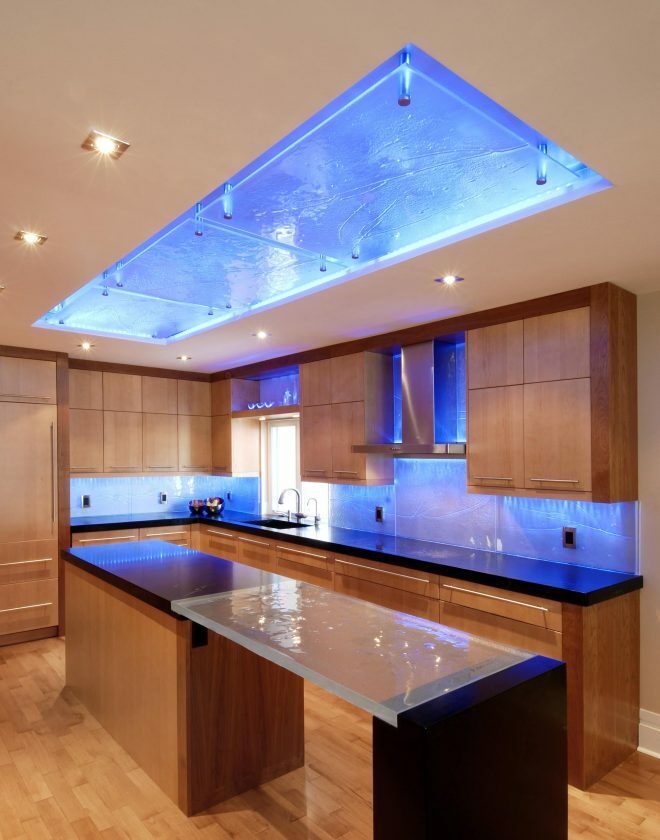
General light. How to organize productively?
There are several norms of good lighting. How to properly organize the lighting in the kitchen so that your eyes do not hurt and all the work argues? One of the most important laws is zoning. All parts of the room (cooking, washing, dining) must have their own light sources. Be sure to take into account the style of the room, the color shades present. And the area of the room is also of great importance.
Attention! Earned on our website kitchen designer. You can familiarize yourself with it and design your dream kitchen for free! May also come in handy wardrobes designer.
Proper kitchen lighting starts with a design project. During preliminary planning, you should leave room for switches, sockets, LED lights in the computer or on paper. Solve all the questions at the moment when the wires are pulled and the wiring equipment is being marked. If you take care of this after the repair, then you will have to pull the wiring from the top or make special channels for the cable.
The second basic rule is versatility Do not use one or more lamps in the center of the kitchen. This is not enough for normal lighting and this trend is becoming a thing of the past. If you are not the owner of a huge country kitchen and do not cook on an island or peninsula in the center of the room, then in in a medium-sized apartment, while washing dishes or cutting food, a person will stand with his back to the main light source, obscuring it. Therefore, the illumination of the working area is a prerequisite for productive work and preserving the vision of kitchen owners.
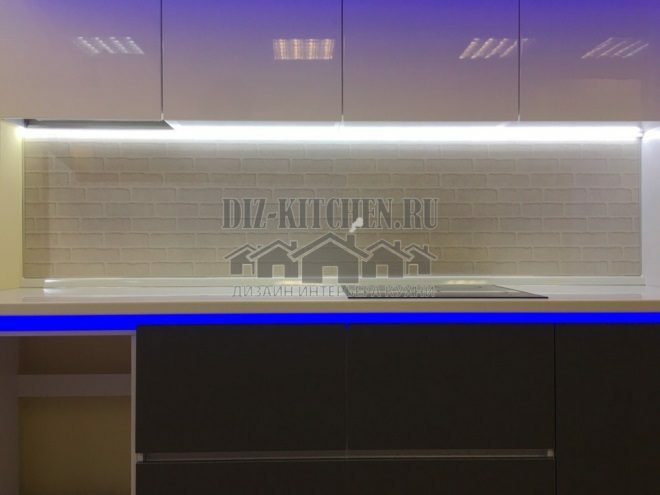
Do not forget about multilevel as well. It is in this case that the light will be organically distributed, creating a unique and interesting space. It is very good when you can adjust the brightness of the lighting. For example, when doing some painstaking work at the dinner table, increase the brightness. And if you want to arrange a romantic dinner, be able to turn the room into a mysterious boudoir with a gloomy light that will not tire your eyes.
Spotlights, spots
Spot lights are ideal lighting for kitchens with low ceilings. A large chandelier or pendants get in the way, they are hurt by the head.
Such lamps are also called spots. They should be at least 20 cm from the wall and 30 cm from each other. Otherwise, the light diffuses poorly. But on the other hand, they almost never shine directly in the eyes.
The disadvantage is the fact that their installation is more difficult than that of other species. In a stretch or plasterboard ceiling, you can distribute spotlights over the entire surface or lay out an interesting pattern. Selecting the perimeter of the room will visually raise the ceiling, making the room more spacious.
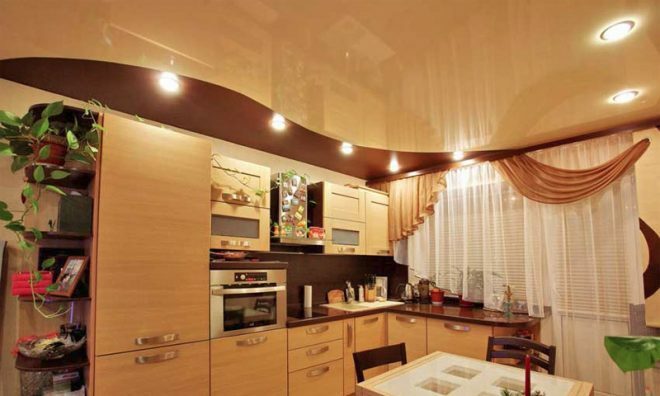
When installing spots in a stretch ceiling, pay attention to the safety requirements. The spots should not be heated, because the stretch fabric is sensitive to temperature. PVC film will withstand incandescent lamps up to 40 W, halogen ones - up to 20 W. Satin - 60 and 35 watts, respectively. LEDs are the best option. They do not heat up, are economical and provide enough light.
Large kitchens
The arrangement of lamps in a large kitchen has its own characteristics. Light accents will help divide the room into zones. A kitchen combined with a living room, with a bar counter, a peninsula or an island - in any case, you should carefully consider the correct location of the lamps.
With different floor heights, an effective solution would be to install the light source in the threshold-drop, which will additionally create a border.
A great idea is to equip a large room with swivel shades. Rotating in different directions, they will create new perspectives and projection, highlighting a new zone each time.
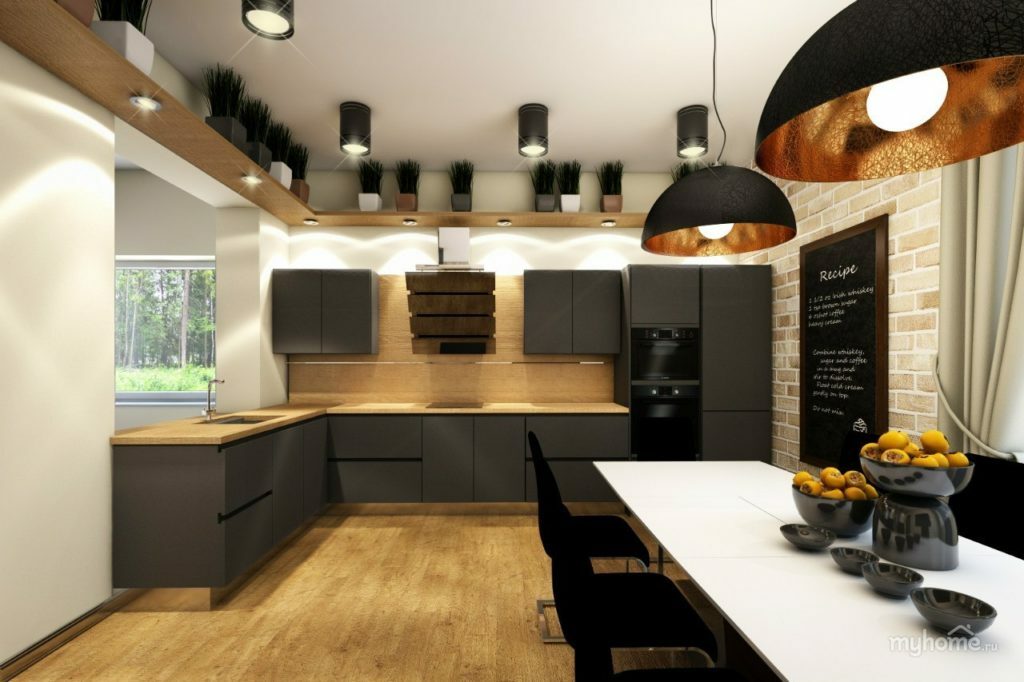
Using a pantograph lever on a flexible structure, it is easy to move the lighting fixture along a bar counter or a long table. But such a solution is more suitable for modern trends (hi-tech, grunge, minimalism, loft).
It is very convenient when the backlight is turned on in parts, and not all at once. This saves electricity and makes it possible to illuminate only the required areas.
Work zone
There are many options here too. One of the simplest and most common is the built-in illumination under the upper modules, on their lower side. A directional light is provided, especially when installed closer to the outer edge. Illumination can be in the form of overhead structures, LED strip, long fluorescent bulb. But too bright a light will dazzle the eyes of those sitting at the dining table.
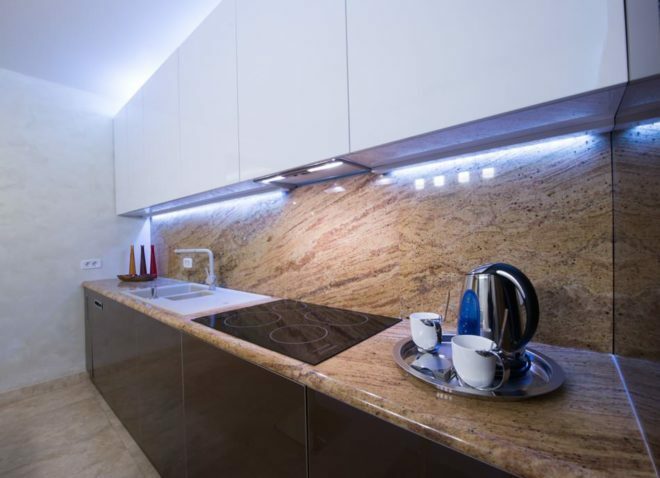
If your cabinets do not reach the ceiling itself, then the backlight is placed along the top row, making a special furniture visor or simply pushing forward the cornice with lamps. Another level is made of drywall above the cabinets and the lamps are built into the ceiling.
New items in recent years - automatic switching on when the cabinet door is opened (like in a refrigerator) or lighting of open shelves.
The light embedded in the glass apron (skinali) will create an effect of depth and additional projection. It looks especially original in pictures where there is a foreground and background.
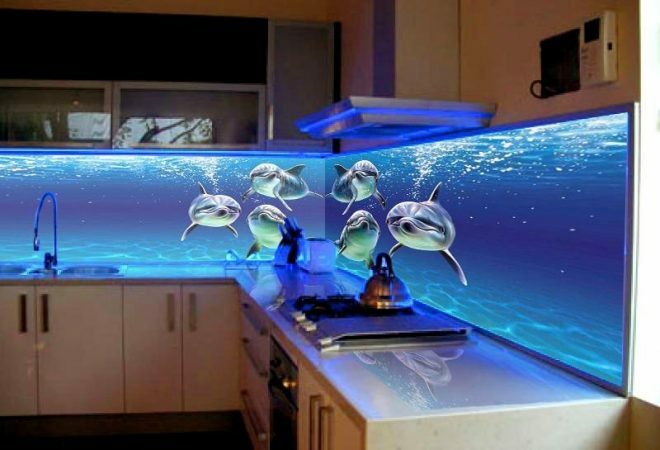
One of the simplest options is to fix adjustable swivel lights (like spotlights) on the top row of sections. The main thing is that they do not stand out in the overall design of the room.
Lighting in a small kitchen has its own characteristics. First, the dimensions of the main lamp should be proportional to the square of the room. Agree that a pompous chandelier in a small Khrushchev will only cause bewilderment.
A small chandelier in the center and an additional source in the work area is enough. By installing LEDs under a worktop, in a plinth or by cutting them into a façade, you get a spectacular kitchen that floats in the air. A small space transforms instantly.
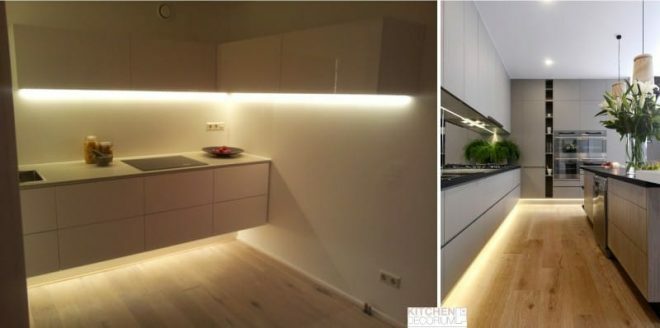
Dinner Zone
Here the light should be softer, in comparison with the working area, somewhere two times. If you put a table near the window, then in some cases you can do without it. Most often, the main light source (a large chandelier or several suspensions on long adjustable cords) is located above the dining area or very close to it. The latter option looks especially impressive in a large room located above an island or peninsula.
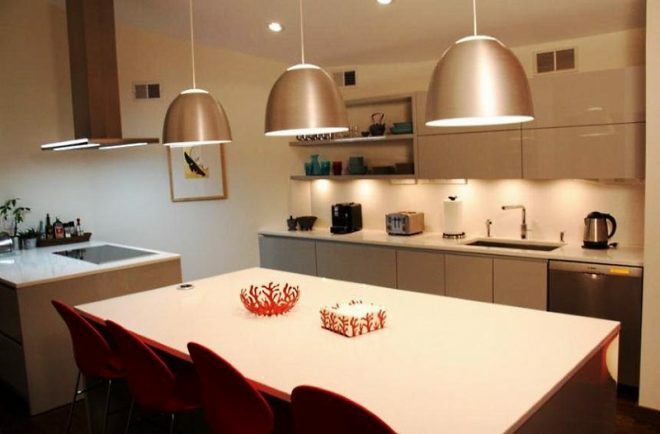
The optimal distance from the lamp to the table is one and a half meters. The higher it is, the brighter the light, the lower it is, the more comfortable and homey it will be in the kitchen. If you integrate upward-facing directional spotlights into the top row of cabinets or into the ceiling, you can raise the ceiling, creating a floating effect.
For owners of a standard table (square or round), a central lamp is enough. But an oval, elongated or rectangular bar counter will require several that will illuminate the surface with better quality. When the table is near the wall, sconces are often used. It should illuminate the entire surface, so place the plafond at least 50 cm from the wallpaper.
Principles and requirements for light
Kitchen lighting is always two zones. In the main, working one, the brightest light is required, and in the dining room, soft tones are allowed. The presence of lighting in each of the zones does not exclude the central chandelier. This is especially true in large rooms, where the light spot in the middle evens out uneven lighting around the edges.
The more light you have, the less power of the sources. Remember that facades (especially glossy ones) and walls reflect glare. Light surfaces - up to 75%, dark - up to 15%. Therefore, the lighter your interior is, the less lamp power it will require.
It is allowed to combine two types of lighting in one room (for example, LEDs and a fluorescent lamp). But it is much more difficult to successfully select three sources, and sometimes you cannot do without the services of a designer.
Based on the scale of the light temperature of the lamps, try to buy lamps of the same light. 2700 to 3300 Kelvin is warm white, 3300 to 5300 K is natural white, above is cool white. Natural white and warm is best for the eyes, but cold light with its lifeless lighting is less suitable.
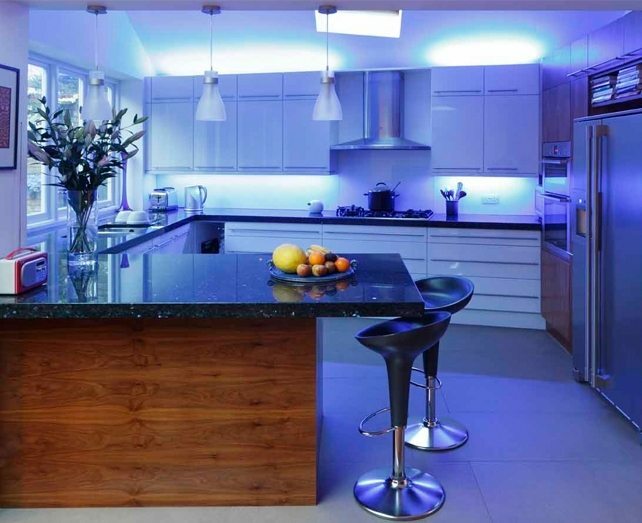
For elongated rectangular rooms, get a long shade that distributes the light more evenly.
Lighting rates and units
The illumination rate is 150 Lux (or Lumens) per m2. Today, they no longer count in Watts, since an ordinary LED light bulb up to 10 W can emit as much light as an old 50 W incandescent lamp.
How much light is required for a 10 m2 kitchen? Multiply the norm by the area: 150 Lx * 10 m2 = 1500 Lx. Therefore, you should take lamps that, in general, will give at least 1500 lumens.
If your lighting is distributed by zones, then each area should be lit separately. On the plan, calculate the zones separately and how many lamps are required. But keep in mind that two 50W devices will give about a third less light than one 100W.
Types of lamps, their color
LED strip is one of the most popular sources of additional light. It is not afraid of moisture, as it is protected by silicone, small, does not heat up as much as incandescent lamps. The adapter is heating up, because the LEDs do not fit into the standard 220 W (the level of protection must be IP44 and higher).
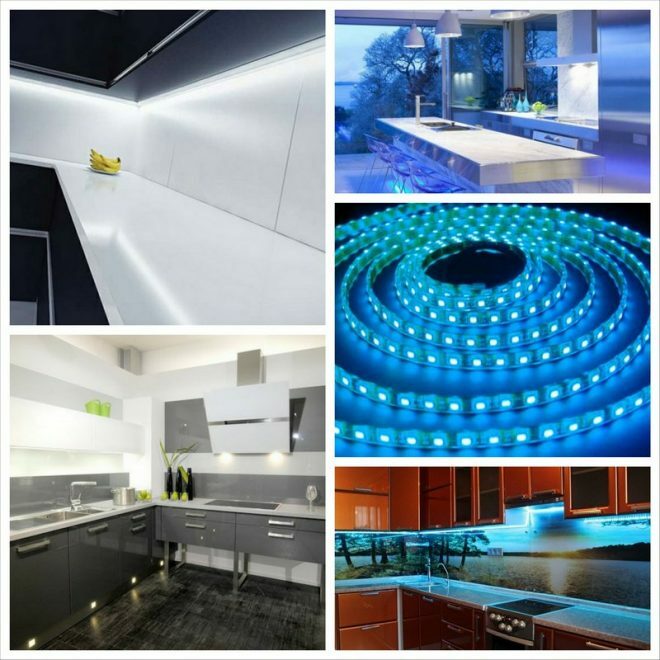
The larger the crystals, the better the brightness. Even a beginner can handle the installation of LEDs, because they can be mounted directly on furniture using a sticky layer. The second option is a special base or magnets.
The high durability of the LEDs ensures their long-term operation. And even disposal does not require special conditions. Compared to other light sources, they are more expensive, but this is offset by a long service life and low energy costs (up to 85%). Another drawback is that if they break, it is often completely.
Incandescent lamps are cheap, they are not afraid of unfavorable temperatures, condensation. They have a wide range of sizes, modifications and capacities. The main disadvantage is low light output in comparison with other lamps, fragility and short service life.
Halogen - last longer and shine more efficiently than incandescent bulbs. But they are quite noticeably heated during operation and fingerprints leave ugly black spots. RC halogen are considered to be the best, as they contain a special coating that blocks infrared radiation, which prolongs the service life and reduces energy costs.
Luminescent is a high luminous efficiency, diffused light, a relatively long service life and a wide range of shades (white, yellow). At the end of its service life, light pulsation often begins, which is bad for the eyes. They also contain mercury, which makes disposal difficult. And in case of mechanical damage, a broken flask will do harm.
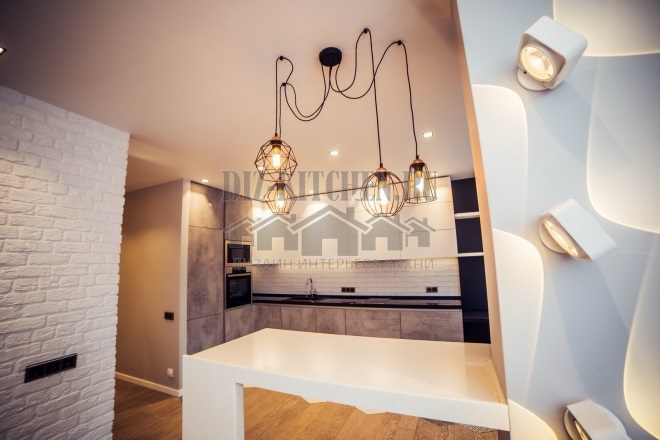
Think over the lighting zones, install beautiful and stylish lamps in them and your kitchen will turn into a comfortable and shining kingdom of light.
average rating 0 / 5. Number of ratings: 0
No ratings yet. Be the first to rate.


